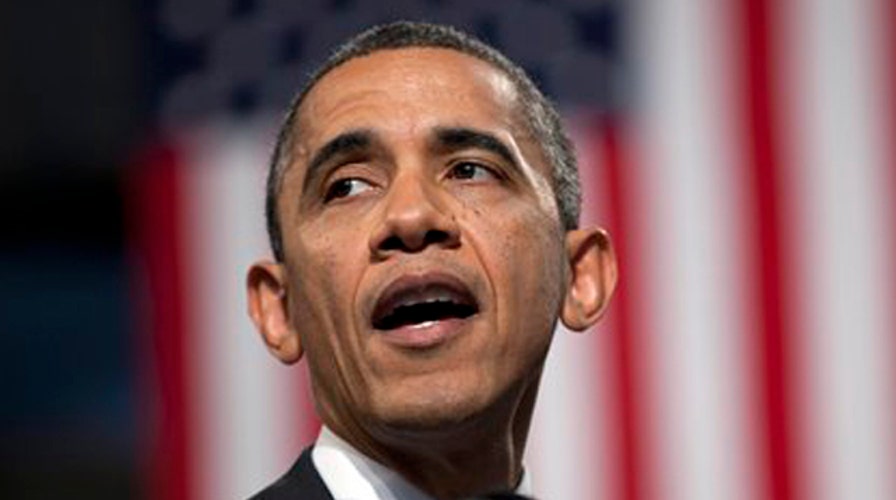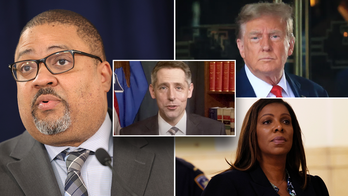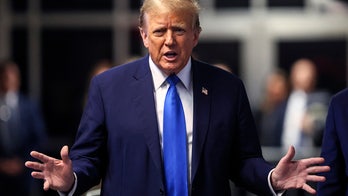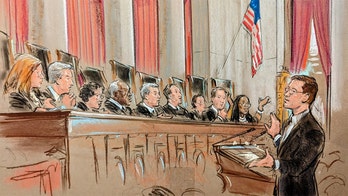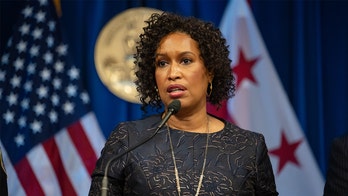“Any notion that there is a set price for a meeting with the president of the United States is just wrong. As you know, Organizing for Action was set up to promote the president's public policy agenda. Therefore, as anyone would expect, the president would likely meet with their representatives to discuss his agenda. But again, any notion that there's a price for meeting with the president is simply wrong.”
-- White House Press Secretary Jay Carney responding to FOX News Senior White House Correspondent Ed Henry about a New York Times report that donors who give $500,000 to the president’s campaign will get access to the commander in chief.
One can’t say that the White House is exactly “pushing back” on the story that donors to the president’s precedent-setting permanent campaign apparatus will get access to the big boss.
Nudging back, maybe.
The best one can say is that White House Press Secretary Jay Carney disputes the reporting in a New York Times story of two weeks ago that the threshold for top-level access to President Obama is $500,000.
There’s no set price, Carney said Monday. So, aside from the hopes of bargain-hunting donors, what’s the difference?
Had Carney said that the donors to Obama’s campaign arm would be granted no access or special treatment from the president, it would have been a big deal. But then, the kinds of people who write huge checks to political organizations don’t just do it because it makes them feel good.
Those folks want access, influence and face time. When people write big checks to candidates during campaigns, they are usually doing it for the promise of influence after the election. It’s an investment of sorts.
With a president who has already been re-elected, though, it’s a no-risk investment.
Yes, there is the uncertain promise that more donations will help achieve specific goals through the federal government. That’s an appealing small risk if you are in one of the president’s preferred industries and are seeking subsidies or if your company is on the Obama naughty list and seeking more favorable regulations.
But with the first-ever permanent campaign, the old anxiety for deep-pocketed donors – “What if this guy loses?” – is gone. And without limits on contributions or donor fears of suffering the wrath of a rival candidate if he or she is elected, this could be a fundraising bonanza. Low or no risk, immediate access and low public scrutiny: What more could a donor want?
So it wouldn’t do to push back too hard on the notion of selling access. That’s why Carney took umbrage at there being a specific sum that would get a donor in the president’s ear. It’s not so mercantile as that, Carney said. Plus, it’s the campaign itself not the White House that will decide who gets what levels of access and which stakeholders should be invited to help the president craft his agenda.
[pullquote]
The Times article and subsequent reporting by other outlets have been ideal advertising for Obama’s fundraising drive. Carney must defend the propriety of the enterprise, but does not want to do so with such vehemence that potential donors get put off.
Carney also promises transparency. Which means months or years from now when all of the donors have been disclosed and matched up with all of the White House visitor logs we may find some overlap. Of course, we’ll never know about all of the president’s phone calls or all of the people with whom he will huddle backstage at campaign and official events.
But, yes, one day, late in the Obama presidency, there will be a headline something like “Logs Show Campaign Donors Made Frequent White House Visits.” And the world will shrug and move on down the path. Most people already assume that politicians are for sale to some degree, so what difference would such a revelation make, especially ex post facto? And even if there were outrage, what will it matter to a president already heading for the exits?
It’s also all perfectly legal, just as it would have been for Obama’s predecessor. It’s not that Obama is exploiting some new legal loophole that allows him to have a permanent campaign funded by influential folks seeking more influence still, it’s just that his predecessors were either not so creative or so brazen as to try it.
It is both transparent and legal to offer access to the president for deep-pocketed donors. But is it good? Is it healthy for the citizenry? Is it appropriate? Is there accountability or just transparency? These questions are less happy for the administration.
The worst questions of all, though, relate to what comes after Obama’s latest fundraising innovation.
Will every president have a permanent, limitlessly funded political arm with which to batter his or her opponents? Is the Obama model of permanent campaign without private negotiations the new reality for American government? Will wealthy donors find more and more ways to indebt office holders?
When Obama ditched limits on campaign expenditures in 2008 he argued that he needed to do so in order to win and… reduce the influence of money on government. When Obama became the first president to give his blessing to a Super PAC to accept and spend unlimited donations it was needed in order to win and… reduce the influence of money on government.
Now, the president has won and has decided to become the first in history to maintain his own private, permanent political campaign deepening the influence of money on government.
Perhaps after the Midterm elections, Obama and an all Democratic Congress will get serious about curbing pay-for-play politics. And if you want to help, send your donation in care of Obama’s permanent campaign.
Chris Stirewalt is digital politics editor for Fox News, and his POWER PLAY column appears Monday-Friday on FoxNews.com. Catch Chris Live online daily at 11:30amET at http:live.foxnews.com.
